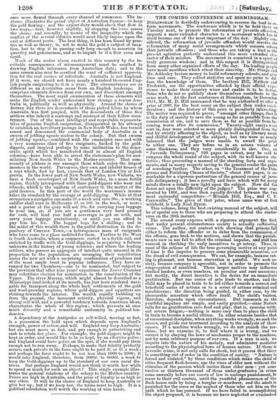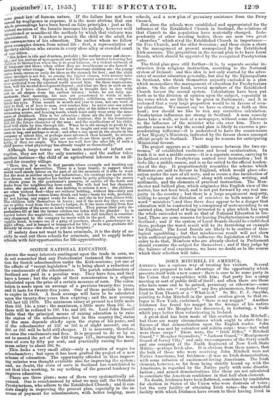THE COMING CONFERENCItaAleillIRMINGHAIC BIRMINGHAM is 'decidedly endeavouring to recoVer its
leod in re_ form movements. The conference which is ' tel be held there on Tuesday next, to promote the reformation of jhvenile offenders, imparts a more extended character to a movement -*Ili& has in itself become one of the most important ef the tlayi Rightly eee., sidered, the reformation of juvenile--offendera itkvolve the reformation of many social arrangements 'which' coneetn• °there than juvenile offenders ; and those who are taking a lead in the_ present agitation perfectly understand this more extended elm- rider d their mission. The movement is coneeived -in a spirit of truly generous wisdom ; and in this respect it is distinguished from many other organized efforts of the day. Its leading people have made sacrifices which attest their sincerity. :Mr. Sterge cad. Mr. Adderley bestow money to build reformatory schools, and give time and care. They collect statistics and spare no pains to dif- fuse the knowledge of them. The brothers Hill, Mathew and Frederick, use the opportunities afforded by their official expe. rience to make their country wiser and enable it to be better, Some who do not so publicly show themselves contribute to the same work. At the first conference at Birminghanyirt Deeember 1851, Mr. M. D. Hill announced that he was autheriZed to offer a prize of 200/. for the best essay on the subject than 'under con,i- deration ; and the history of this prize is peculiarly intereqing. The writer was required to prove, "amongst other things, that it is the duty of society to save the young as far as possible from the commission of sin, and to save them as far as possible from be- coming worse after its commission." Twenty-eight essays were sent in, four were selected as more plainly distinguished from the rest by strictly adhering to the object, as well as by literary merit and skilful development of the subject; but two were so nearly balanced that the judges were unable to award the prize to either one. They are before us in an octave 'volume of some thickness, and they vary considerably in size. One, on " Juvenile Delinquency," 320 pages in extent, may be said to compass the whole round of the subject, with its well-known sta- tistics ; thus presenting a manual of the standing facts and argu- ments, and in many respects saving to the general reader the pains of searching further. The other, on "the Treatment of the Dan- gerous and Perishing Classes of Society," about 100 pages, is re- markable for a vigorous portraiture of the general causes of juve- nile delinquency; it has a novelty and force which will for many minds throw a totally new light upon the subject. How did the donor act upon the difficulty of the judges? The prize was aug- mented by 1001., and was then equally divided between the two most successful competitors—" liticauth Hill, Esq., and C. F. Cornwallis." The giver of that prize, whose name was at first withheld, is Lady Noel Byron.
This volume, being the best existing manual of the subject, will be of special use to those who are preparing to attend the confer- ence on the 20th instant.
The second essay exposes with a rigorous argument the fact, that under present circumstances society is actually cultivating crime. The author, not content with showing that prisons fail either to reform the offender or to deter from the commission of the offence, goes back to the motives, and shows that the punish- meats now in use fail to affect the criminal impulse, -and still less succeed in checking the early incentives to go astray. Thus, in most of the actions of life the true governing motive at any 'point of time is the impulse to procure some pleasurable sensation, not the dread of evil consequences. We eat, for example, because eat- ing is pleasant, not because starvation is painful. We seek so- ciety, because company is agreeable, not in order to promote the congregation of mankind. Those larger motives may influence studied leaders, or even numbers, on peculiar and rare occasions; but mostly, the direct incentive is the desire for an immediate gratification. But one series of acts leads to another, and the child may be placed in train to be led either towards a correct and beneficial series of actions or to a series of actions criminal and mischievous ; the direction being guided, in either case, by the pleasurable sensation which offers itself. The child's tuition, therefore, depends upon circumstances. But inasmuch as the youthful impulses are simple, and easily gratified,—since Nature calls for no gratification save food and play, that is, exercise- with- out severe fatigue,—nothing is more easy than to placa the child in train to become a useful citizen. In other sciences besides that of correctional discipline, when anything works wrongly, we seek the causes, and guide our treatment according to the analysis of those causes. If a machine works wrongly, we do not punish the ma- chine, but we examine it, to find where it is wrong, and Ive correct it by obeying the laws of mechanics proper to the machine; not by some arbitrary purpose of our own. If a man is slat, we inquire into the nature of his malady, and administer 'medicine according to the physiological laws of human nature; .141rthere is juvenile crime, it not only calls for check, but it proveriothat there is something out of order in the condition of society. "dtiature is forced and violated," by those conditions which make dIfe child of cities frequent flash-houses, ape the vices of elder men withenrt the stimulus of the passion which incites 'those elder men : yet some twelve or thirteen thousand of these under-graduates in crime come annually before our courts of law to undergo punishmen to recur to their evil courtes, until the youthful phanomenowof the flash-house ends by being a burglar or murderer,' and the adult is punished for the error or the neglect of those whie set him on the path which he has pursued. If we have failed in accomplishing the object proposed, it is because we have neglected or overlooked .atlAsTOfikhithi nature. If the failure has, not been
so
cased by,negligeseain ,expense, it is the more obvious that our whole pr000Klings have been based on false principles : just as the violent erlereien of the lunatic increases his malady, however well ietentioneflur munificent the -methods by which that violence was administered' It is useless to punish the child or the adult for tkowilloqueuces of his education. The author whom we follow Eiees,exfunplea drawn-from actual life : first, a representative of ledirtrobildren. who swarm in every close alley or crowded court of,oeteities. • ego, father is idle and drunken, probably nd ; his mother coarse a shrew- ,31„,iipsIlier notions or management and discipline are limited to leaving her children id thernselves when she is in good humour, or a violent outbreak of in traguage and blows when either they are troublesome or she herself is iiiitated by 6ther things.' We know how observant children are: the young. attio brain craves as early for ideas as the stomach for food ; and the child Irbeseintellect is not fed, as among the higher classes, with nursery tales and instructive books, depends wholly for his mental sustenance or impres- sions gatherer' from the external world around him. On these impressions, then, will his mental developmentdepend ; and what are they in such an in- stance as I have chosen? Such a child is brought face to face with evil in all .shapes from his earliest infancy : before he yet fully un- drotArgle,, their meaning, his ears are accustomed to words of inde- cpcy,ank profanity; Intemperance, brutality, selfishness, are constantly before' his eyes. From month to month and year to year, not one word of doty to God, or ,of love to man, ever reaches him : he never sees one action which it is good to imitate ; but he cannot play at his father's door without witnessing scenes and hearing words, which must early wear away the inno- cence of childhood. This is his education ; these are the first and conse- quently the deepest impressions his mind receives; this is the foundation laid for the future character of the man : and the recollections of his child- hood will abide by him through life. When he is old enough to profit by it, inetrisetioit is added to education, and he is taught and sent out by his pa- rents to beg, and perhaps to steal ; and after a day spent in the streets in the company of others like, or perhaps more advanced than himself, he returns home—to be beaten if his gains are small—to see them spent in gin, pro- hably; if they are ample. We know too well how the after life of such a child proves what physiology has already taught us theoretically."
Although large towns are the main nurseries of infant cor- ruption, they are not the only nurseries ; and the author takes another instance—the child of an agricultural labourer in an ill- cared-for country, village. "Were, too, it is easy to find parents whose example and teaching can only corrupt and demoralize. There is a large family, to support which would nod steady labour on the part of all the members of it able to work But ,the man is neither steady nor industrious ; his earnings are spent at the teer,bouse, and he supplies his further wants by petty pilfering—he snares or abbots game in the gentleman's preserve, or carries off the fowls and docks from the neighbouring farm-yard. The wife had lost her character before she married; and she does nothing to redeem it now ; the children are often without hod—they are without bedding, without fire—dirty and ragged. The father comes home drunk and testy—beats his wife, probably, for not having any supper ready for him ; and she in her turn abuses him. The children hide themselves in terror ; and if the next day they are sent out to pilfer wood from the farmer's hedges, do it the more readily from fear Of rirepetition of the scene so lately witnessed. They pursue their petty de- predationctill at the farmer catches one laden with his plunder : he is carried before the magistrate, committed, and his dull intellect is consider- ablyishamened by the company he meets with in the gaol, lie returns a capable hand, becomes one of a gang of poachers, shoots a gamekeeper in a night affray; and is banged or transported for life; or he may graduate dif- ferently in ,crime—fire stacks, or join in a burglary."
Tf society does not want to have criminals, it is the duty of so- ciety to root out these schools for criminals, and to supply better schools with fair opportunities for life-apprenticeship.



































 Previous page
Previous page